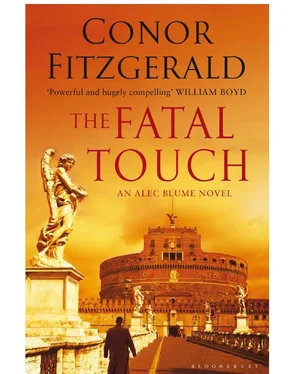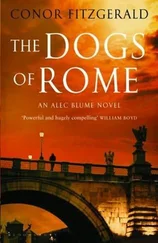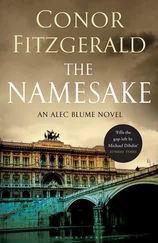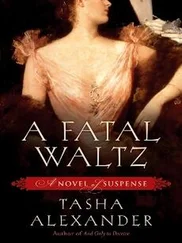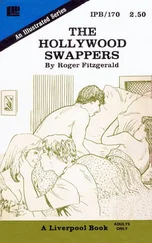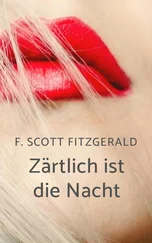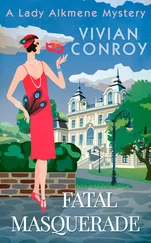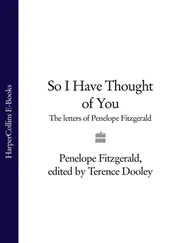Conor Fitzgerald - Fatal Touch
Здесь есть возможность читать онлайн «Conor Fitzgerald - Fatal Touch» весь текст электронной книги совершенно бесплатно (целиком полную версию без сокращений). В некоторых случаях можно слушать аудио, скачать через торрент в формате fb2 и присутствует краткое содержание. Жанр: Полицейский детектив, на английском языке. Описание произведения, (предисловие) а так же отзывы посетителей доступны на портале библиотеки ЛибКат.
- Название:Fatal Touch
- Автор:
- Жанр:
- Год:неизвестен
- ISBN:нет данных
- Рейтинг книги:3 / 5. Голосов: 1
-
Избранное:Добавить в избранное
- Отзывы:
-
Ваша оценка:
- 60
- 1
- 2
- 3
- 4
- 5
Fatal Touch: краткое содержание, описание и аннотация
Предлагаем к чтению аннотацию, описание, краткое содержание или предисловие (зависит от того, что написал сам автор книги «Fatal Touch»). Если вы не нашли необходимую информацию о книге — напишите в комментариях, мы постараемся отыскать её.
Fatal Touch — читать онлайн бесплатно полную книгу (весь текст) целиком
Ниже представлен текст книги, разбитый по страницам. Система сохранения места последней прочитанной страницы, позволяет с удобством читать онлайн бесплатно книгу «Fatal Touch», без необходимости каждый раз заново искать на чём Вы остановились. Поставьте закладку, и сможете в любой момент перейти на страницу, на которой закончили чтение.
Интервал:
Закладка:
“Withdraw it from sale?”
“No. He’d apologize, and ask them if they were interested in buying it as a copy or a pastiche instead. Often they said yes, and the painting would go out with just the surname but not the Christian name of the artist, which is the convention used for imitations. The important thing is, it remains legal. Art forgery, dealing, even theft and ownership-all categories that are hard to pin down. Legally speaking, art is a very gray subject.”
Without warning, Colonel Orazio Farinelli’s face turned the color of a damson plum. It was not until beads of sweat appeared on his forehead that Blume realized what he had taken for an expression of inexplicable rage was the result of the Colonel’s efforts to stand up. When the Colonel had made it off his stool, he placed his hands on the table, lowered his head like a penitent until his face and head returned to white. Then he spoke.
“You are absolutely sure you didn’t find a manuscript, a diary, anything like that? Or, if you prefer, I could shorten the conversation and ask you where you put the one you found.”
Blume opened his hands like a priest blessing the broken bread on the table, then he, too, stood up. “I found nothing of the kind. But I am interested in your insistence on these papers. Perhaps we should look for them together?”
The Colonel said nothing, but walked back into Treacy’s living room, where he eased himself into a leather armchair.
Blume cleared some art books off the bulging settee, and settled himself on it, and looked over to where the paintings and sketches had been.
“I see you have been removing things from here.”
“True,” said the Colonel. “As you can see, I’ve left that painting with the seaport, classical ruins, ships on the wall. Take it down, pop it out of its frame, have a close look at it.”
Blume was interested enough in where this was leading to do the Colonel’s bidding. He unhooked the painting, and immediately checked the back where he saw a monogram made up of the letters “HRTR,” with the “T” done like a tower.
“I like the way you checked immediately for a signature on the back,” said the Colonel. “There’s one on the painting itself if you look closely. Anyhow, HRTR stands for Henry Treacy. That’s his mark, so he was not going to sell that as an original. Now tell me, does it look like it could have been painted three hundred and thirty years ago?”
“I don’t know. The colors are dark. The paint is cracked everywhere. Thousands of tiny squares.”
“How does it smell?”
Blume made a skeptical face, but brought his nose down to the canvas. “Dusty, woody, a little sweet. It smells old,” he said. “It’s very glossy and hard to see this close.”
“And seeing as you’re that close, can you see any wormholes?”
“Yes,” said Blume. “Quite a few, now.”
“Look just inside the rim of one of the wormholes. What do you see?”
“I see nothing. What am I looking for?”
“Ink or paint.”
Blume moved his head back slightly, and realized he could see the canvas better. Was that the first sign of needing old-man reading glasses?
“I see no ink inside the holes.”
“Of course not. If the painting is genuine, there could be none, since the wormholes are supposed to come after the composition, so how would color get into them unless it was false-new paint on old canvas, see?”
“Yes.”
“And yet, convincing though this may seem, it wasn’t good enough for him to market. He liked it enough to sign it. Maybe he used it to show what he could do. Personally, I think he darkened the tone too far. Treacy ran the most incredible risks. His whole left cheek was wrinkled and scarred from burns he gave himself back in the ’80s from boiling oil. He tried to create black oil to darken a painting, and mixed it with mastic varnish. Knowing him, he probably did it next to cans of turps and benzene, too.”
“Yes. He had a beard that covered most of the scars.”
“He grew a beard? My, my,” said the Colonel. “It really has been some time since I saw him. I can’t picture him with a beard. Always so vain. He even thought his scar was romantic.”
Blume looked at the back of the canvas again. “It’s got faded stamps, mildew, even some old netting or something, like it came from somewhere else. It’s convincing.”
“Yet this is one of his rejects,” said the Colonel. “I don’t suppose you’d be so kind as to pass me that bowl…”
Blume passed a bowl of fruit to the Colonel, who plucked out an apple and bit it in half. “Floury, old. A still-life apple,” he said. “Disgusting.” He finished it with four more bites and balanced the core on the arm of his chair. “Let me tell you what made Henry Treacy special. He had no artistic personality. I don’t mean in real life. He had too much in real life. But when it came to painting, he had no personality at all.”
The Colonel picked up and tossed the core of his apple toward the fireplace. It missed and came to rest beside the bookshelf, just below the gap left by the removal of two marbled notebooks. The Colonel did not speak for a moment, and Blume felt sure he must be staring at the same empty spot. Then he heard a grunt and a crunch, as the Colonel helped himself to another apple and bit into it.
Keeping his movements leisurely, Blume withdrew his gaze from the empty slot on the shelves, and said, “Is no personality a good or a bad thing?”
“For a forger, it’s good.” The Colonel took another bite, and swallowed without chewing. “To know without being known.” He finished the apple and this time dropped the core back into the bowl, then casually fingered a leopard-skin banana. “To know without being known,” he repeated. “It’s a good philosophy for policemen and for serious artists, as well as for forgers. It’s the opposite for politicians and junk celebrities. They want to be known without knowing.”
“And Treacy?”
“I think he began to be attracted by notoriety. So he began to want to be known, which is suicidal if you’re a forger.”
“Suicidal or the sort of thing that can get you killed?” asked Blume.
“Good point. What you don’t want is notoriety or personality. You do not want people to be able to point at a work and say: That’s a Treacy.”
“So he adopted the personality of the painter he was copying?” said Blume.
“Not the personality. What I mean is he didn’t let his own come through. You’re an American, so you must have been brought up watching Westerns, right?”
“Westerns are more your generation, Colonel. I was more into Starsky and Hutch.”
“What’s that?”
“ Kojak, you’ve heard of Kojak?”
“Yes,” said the Colonel.
“Well, Starsky and Hutch were… Never mind. They were nothing like Kojak. Rockford Files? Harry O? ”
The Colonel was shaking his head impatiently.
“ Hawaii Five-0. Jesus, I loved that,” said Blume. He thought of Jack Lord as Steve McGarrett, turning around to look straight at the camera, those three strands of hair out of place, an effect that he used to try and imitate in front of the mirror. Jack Lord had a scar on his face, too, come to think of it. He brought his attention back to the Colonel. “You were saying something about Westerns.”
“Westerns are always set in the 1880s or 1890s,” said the Colonel.
“Well, you’re the expert,” said Blume. “But the American Old West goes back at least to the Gold Rush, which was 1848.”
“I’m not interested in that now,” said the Colonel.
“First you start talking about Westerns, now you’re not interested.”
“You are being obtuse, Commissioner.” The Colonel took the banana, peeled it, and examined the fruit and nodded in approval. He pressed half the banana into his mouth, paused, then spoke.
Читать дальшеИнтервал:
Закладка:
Похожие книги на «Fatal Touch»
Представляем Вашему вниманию похожие книги на «Fatal Touch» списком для выбора. Мы отобрали схожую по названию и смыслу литературу в надежде предоставить читателям больше вариантов отыскать новые, интересные, ещё непрочитанные произведения.
Обсуждение, отзывы о книге «Fatal Touch» и просто собственные мнения читателей. Оставьте ваши комментарии, напишите, что Вы думаете о произведении, его смысле или главных героях. Укажите что конкретно понравилось, а что нет, и почему Вы так считаете.
